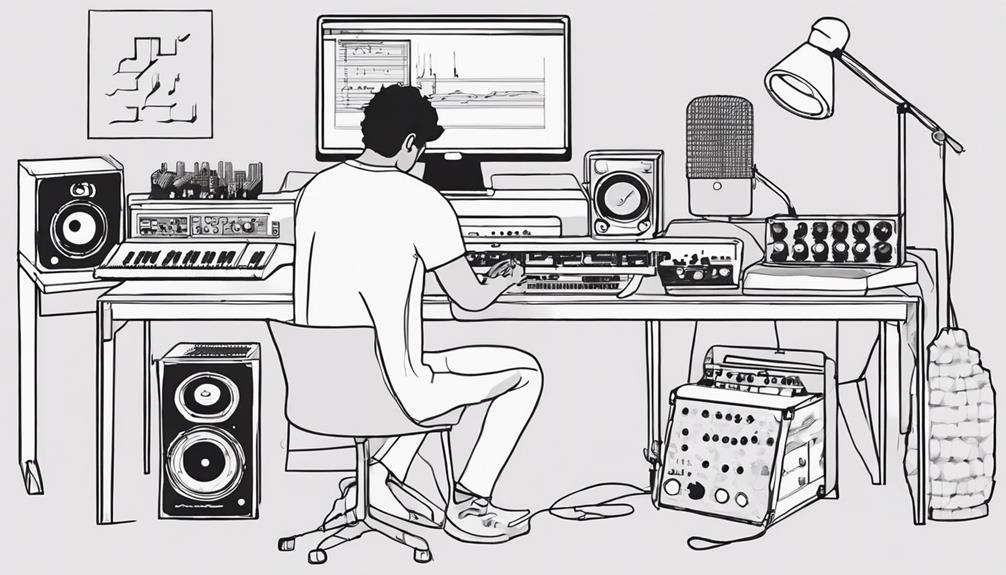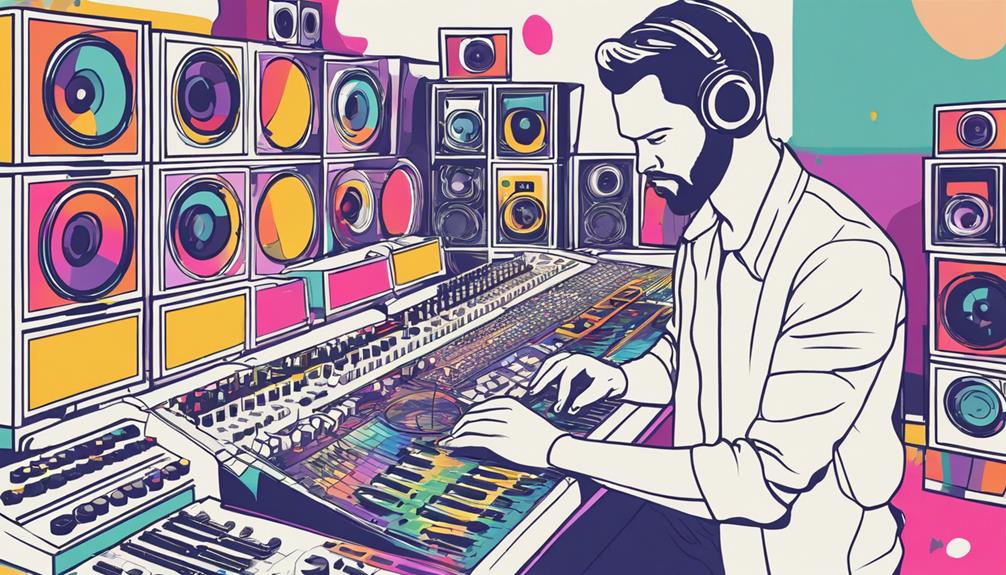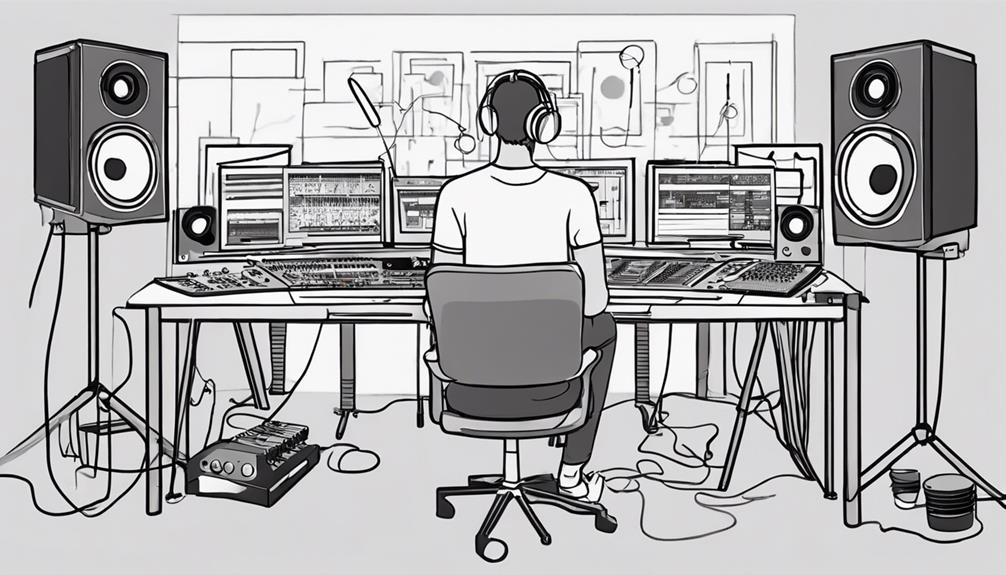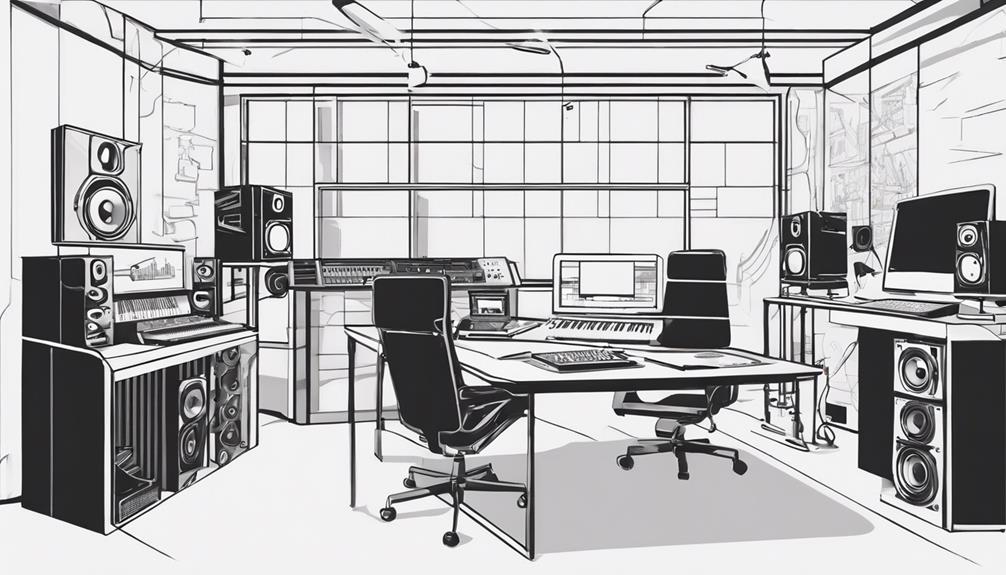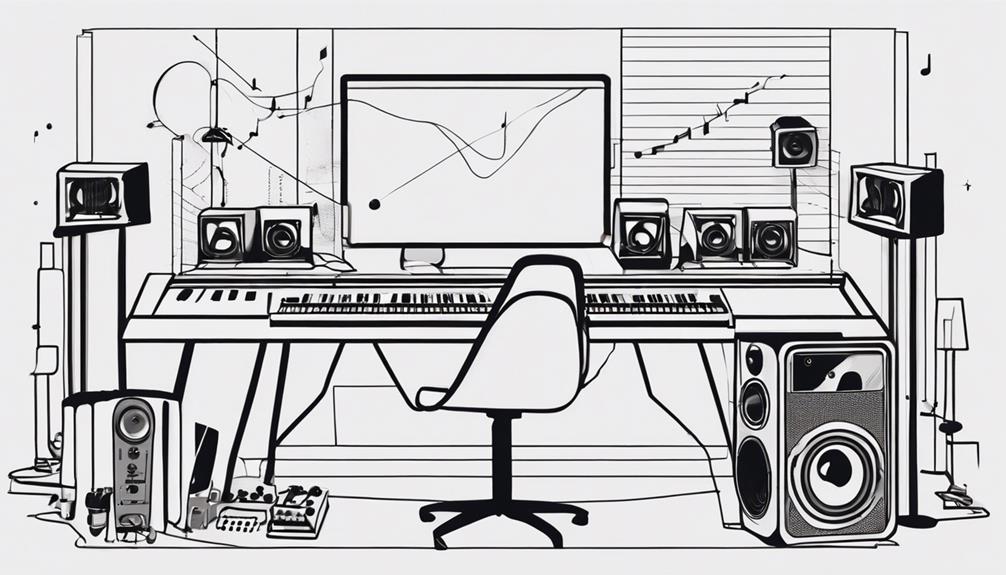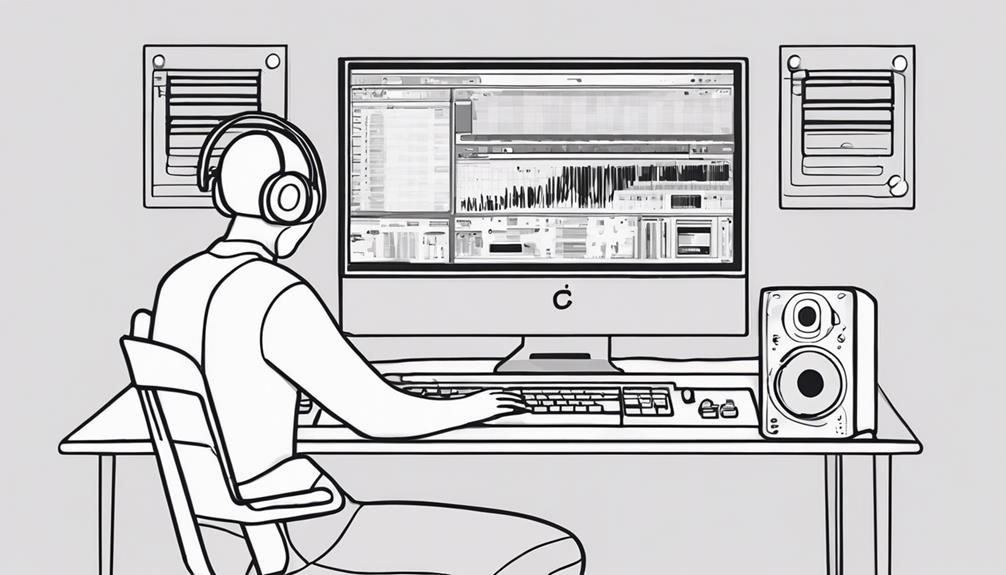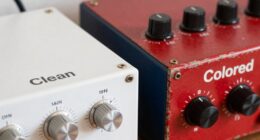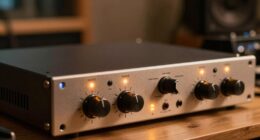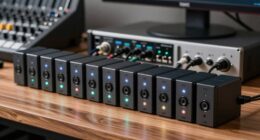Begin your electronic music production journey by setting clear goals. Choose equipment like a DAW, speakers, and MIDI controller. Develop skills in music theory, sound design, and mastering your DAW. Practice creating chord progressions, melodies, and sound design for your tracks. Keep learning through online courses, collaborating with others, and seeking mentorship for continuous growth. Each step brings you closer to mastering the art of electronic music production, opening up endless creative possibilities. Stay consistent with your practice and experiment with different genres to find your unique sound. Leveraging free resources like YouTube tutorials and online forums can help you learn music production independently while building your confidence. Remember, persistence and creativity are key as you continue to hone your craft and express your artistic vision.
Key Takeaways
- Choose a DAW that suits your style.
- Learn music theory basics for composition.
- Invest in quality studio equipment.
- Practice sound design and mixing techniques.
- Collaborate with other producers for growth.
Defining Your Music Production Goals
To kickstart your journey into electronic music production, start by clearly defining your music production goals. Begin by learning how to make electronic music genres like house, techno, or dubstep. Set specific goals for yourself, whether it's releasing a track, performing live, or collaborating with other artists.
Consider your personal preferences, such as your preferred DAW and favorite subgenres, to tailor your journey to your tastes. Define your desired level of technical expertise to guide your learning process effectively.
Identify potential challenges or obstacles you may face in pursuing electronic music production, such as limited time, resources, or technical knowledge. By acknowledging these hurdles, you can proactively find solutions and workarounds.
Keep your music production goals flexible to allow for growth, experimentation, and continuous learning. Remember that adaptability is key in the ever-evolving world of music production. Embrace the journey ahead with enthusiasm and a willingness to explore new horizons.
Choosing the Right Equipment
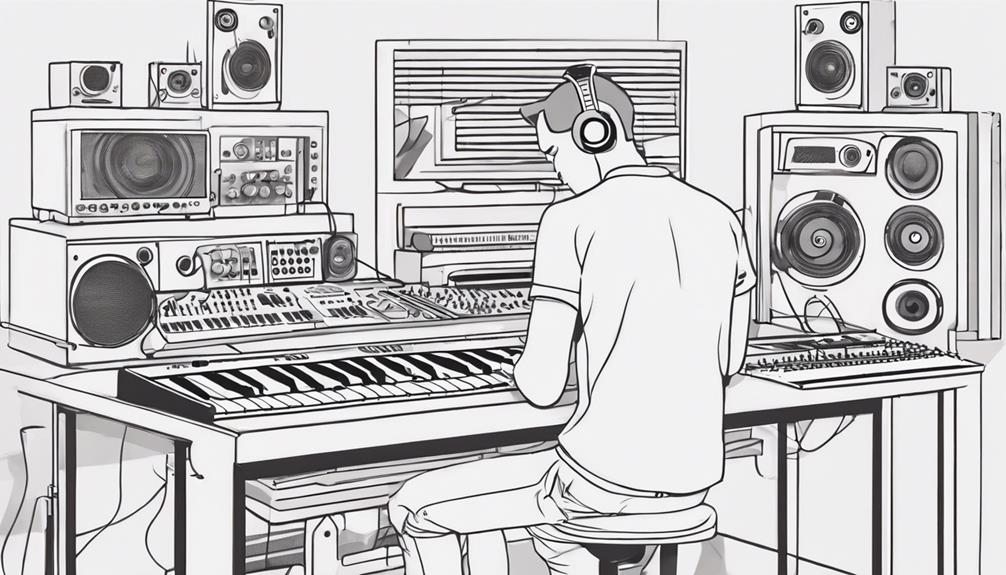
Consider the key equipment needed for electronic music production to establish a solid foundation for your creative process. When diving into electronic music creation, having the right tools is critical. Here are some essential pieces of equipment to get you started:
| Equipment | Description | Importance |
|---|---|---|
| Digital Audio Workstation (DAW) | Software for recording, editing, and producing music digitally. | Essential for music production |
| Studio Speakers/Headphones | Provide accurate sound representation for mixing and mastering tracks. | Fundamental for precise audio |
| MIDI Controller | Enables tactile control over virtual instruments and effects within your DAW. | Enhances workflow |
| Sound Card/Audio Interface | Converts analog audio signals into digital data for your computer and vice versa. | Improves audio quality |
Investing in these core equipment pieces will set you on the right path for your electronic music production journey. Each item plays a critical role in shaping your sound and bringing your creative ideas to life.
Developing Essential Music Production Skills
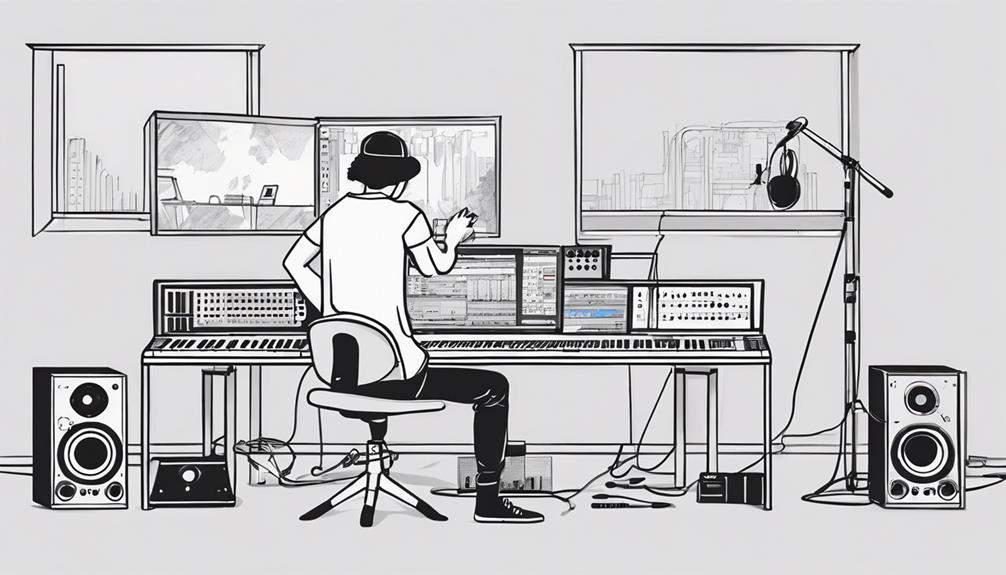
Understanding music theory fundamentals, practicing sound design techniques, mastering your DAW, studying arrangement techniques, and developing mixing and mastering skills are essential steps in developing essential music production skills.
To learn electronic music production effectively, start by grasping music theory concepts like scales and chords to create harmonious tracks. Experiment with sound design to craft unique sounds that define your style across different genres, especially in EDM music where sound design plays an important role.
Become proficient in your DAW, such as FL Studio, to efficiently arrange elements like bass lines and kick drums, essential in electronic music production. Study arrangement techniques to keep your listeners engaged through well-structured progressions.
Practicing Production Techniques
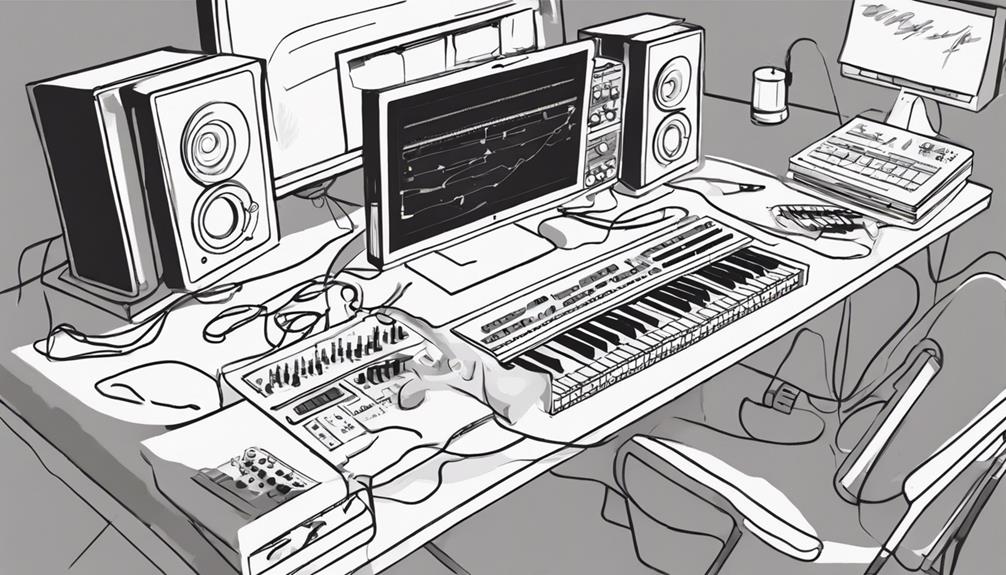
Practice creating chord progressions using different scales and modes to deepen your understanding of harmonic relationships and enhance your music production skills. By experimenting with various chord progressions, you can learn how different combinations evoke specific emotions and moods in your music.
Additionally, focus on developing melodies using a variety of instruments and sound presets to cultivate your own unique style and sound.
Dive into sound design techniques to craft your signature sound and make your tracks stand out in the competitive electronic music scene. Pay attention to layering rhythmic elements such as drums, percussion, and bass to create a rich and dynamic sonic landscape.
When arranging your tracks, strategically build tension, create climactic peaks, and maintain a smooth flow between sections for maximum impact on your listeners.
Continuing Learning and Growth
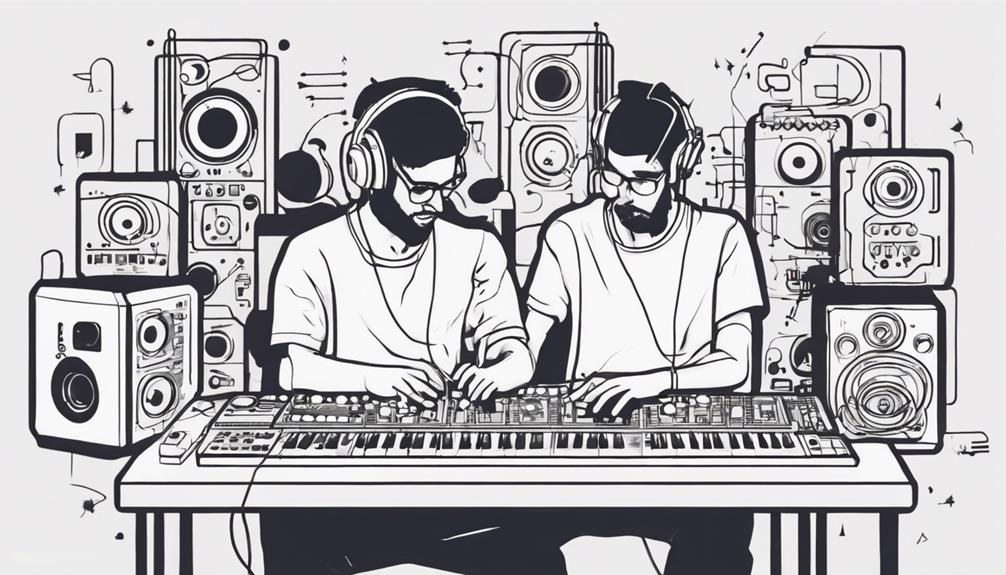
Embrace ongoing learning and growth in electronic music production by actively seeking out new techniques, tools, and genres to expand your skills and creativity.
To continue your journey in electronic music production, consider the following:
- Engage in Continuous Learning: Stay updated on the latest production techniques, tools, and genres by exploring online courses, workshops, and seminars. This will help you evolve with the ever-changing landscape of music production.
- Collaborate for Creative Inspiration: Work with other producers and artists to gain fresh perspectives, feedback, and inspiration. Collaboration not only enhances your skills but also broadens your creative horizons.
- Seek Mentorship for Growth: Reach out to experienced producers for mentorship. Their guidance, feedback, and industry insights can provide valuable support for your personal development in music production.
Frequently Asked Questions
How to Get Into Producing Electronic Music?
To get into producing electronic music, start by choosing a DAW that suits your style and budget. Invest in gear like MIDI controllers and audio interfaces. Learn music theory basics, experiment with sound design, practice regularly, seek feedback, and stay updated on trends.
How to Become an Edm?
Become an EDM sensation by immersing yourself in diverse subgenres, mastering production techniques, understanding song structures, crafting dynamic drops, and collaborating with fellow artists. Let your creativity soar, and soon you'll be ruling the dancefloor!
Can Anyone Make an Edm?
Yes, anyone can create EDM! All it takes is a passion for music, willingness to learn, and basic knowledge of music theory, sound design, and mixing techniques. Engage in online tutorials, courses, or self-study to kickstart your EDM production journey!
How to Start an EDM Track?
To start an EDM track, begin by creating a strong beat or drum pattern. Experiment with chord progressions and melodies to establish the musical theme. Incorporate unique sound presets and synthesis techniques. Add rhythmic elements for depth and energy.
Conclusion
Now that you've taken the first steps towards electronic music production, remember that the journey is just beginning. Keep experimenting, learning, and pushing your creative boundaries.
The world of electronic music production is vast and full of possibilities. Who knows what incredible sounds you'll create next? Embrace the process and enjoy the ride as you continue to grow and evolve as a producer.
The future is waiting for your unique sound to shine.

